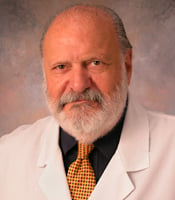Distinguished cardiologist, Louis Cohen, MD, 1928-2018
Louis Cohen, SB’48, MD’53, professor emeritus and distinguished member of the University of Chicago Medicine’s cardiology faculty, passed away surrounded by his children and grandchildren on Jan. 10. He was 89.
 Cohen was a graduate of UChicago who became a talented clinician, respected scientist and popular teacher during his six-decade medical career at the university. He made significant contributions to basic and clinical research, with an emphasis on atherosclerosis, blood lipids, cholesterol, arrhythmias and the diagnosis of acute coronary syndromes. He was author or co-author of more than 70 research publications, plus a series of reports on the large-scale Multiple Risk Factor Intervention Trial, a randomized trial testing the effects of multiple interventions on mortality from coronary heart disease.
Cohen was a graduate of UChicago who became a talented clinician, respected scientist and popular teacher during his six-decade medical career at the university. He made significant contributions to basic and clinical research, with an emphasis on atherosclerosis, blood lipids, cholesterol, arrhythmias and the diagnosis of acute coronary syndromes. He was author or co-author of more than 70 research publications, plus a series of reports on the large-scale Multiple Risk Factor Intervention Trial, a randomized trial testing the effects of multiple interventions on mortality from coronary heart disease.
In the mid-1980s, Cohen and colleagues did important work on the physical chemistry of compounds such as verapamil, which is now used to treat cardiac problems such as hypertension and chest pain. He also chaired the committee that designed the medical center’s first coronary care unit.
Cohen helped develop two compounds for the treatment of Duchenne muscular dystrophy (DMD), one of which is still in clinical use. In 1972, he and colleagues showed that diethylstilbestrol could cause a considerable reduction in the serum enzymes, lactate dehydrogenase and creatinine phosphokinase, which are characteristically elevated in DMD. The reduction was reversible when the drug was discontinued and reproducible when restarted.
From 1963 until 1965, he worked as a visiting scientist studying lipoprotein polymorphism and the chemistry of the HDL apoprotein at the University of Wisconsin with the late Oliver Smithies. In 2007, Smithies received the Nobel Prize for his team’s work on characterizing the structure of HDL cholesterol and its polymorphisms.
Cohen, however, may have been best known at UChicago Medicine for his devotion to patients and students. Throughout his career, he was a model caring physician and a diligent scientist. His enthusiasm for scientific discovery combined with his passion for the details of each patient’s life made him a role model for colleagues as well as generations of young physicians.
“My father treated his patients with kindness, and took time to listen and investigate the cause of their symptoms,” said daughter Ruth Kubicek. “He wasn’t concerned with medicating the problem or treating the symptom. He wanted to know the source, and the cause. He was a preventionist before prevention became popular.”
Cohen conveyed those skills to students at the Pritzker School of Medicine, who chose him for the Excellence in Clinical Teaching Award every year from 1963 to 1969. He was elected twice as president of the medical alumni association and won the Gold Key Award from the Biological Sciences Division in 1996 for his service. He also served as president of the Chicago chapter of the American Heart Association from 1992-1994.
Born Dec. 5, 1928, in Chicago, Cohen spent most of his career at UChicago. In 1948, at the age of 19, he graduated with honors from the College. Emmett Bay, MD, the section chief of cardiology at that time, took an interest in Cohen as an undergraduate student and recruited him to become a research associate in a lipid and coagulation laboratory.
Cohen enrolled in the University of Chicago’s Medical School in 1949 and graduated with honors in 1953. Next, he did his internship, medical residency and a fellowship in cardiovascular diseases at UChicago, followed by an appointment as an instructor in medicine in 1959.
Cohen’s medical training was temporarily interrupted by the U.S. Navy Medical Corps when he was called up for active duty during the early 1960s. This included working with the Care-Medico humanitarian organization during the Algerian War of Independence, for which he received a Presidential Citation from John F. Kennedy.
Back in Chicago, Cohen rose through the ranks to become an assistant professor in 1961, associate professor in 1968 and professor in 1975. In 2007, he received the Distinguished Service Award from the Department of Medicine for his lifetime of service. He took emeritus status in 2011.
Medical students appreciated Cohen’s approach to teaching. His electrocardiogram course, which he co-taught with colleague Rory Childers, MD, was particularly popular. He was also known for developing the school’s preclinical course on clinical pathophysiology and therapeutics. He also mentored research trainees ranging from high school students through college and medical school, as well as graduate and fellowship students.
Outside the classroom, Cohen was the co-holder of three patents: an infusion device, a method of preventing or reducing the size of scars, and a novel treatment for multiple sclerosis.
A funeral service was held Jan. 12 at the Jewish Funeral Home in Skokie, Illinois, followed by a graveside service. In addition to his daughter, he is survived by two sons, Frederick and Curtis, eight grandchildren and six great-grandchildren.
